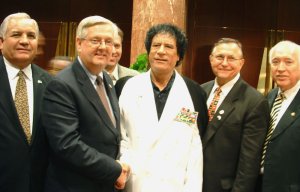Nick Charles: 1981 will also be remembered for the hunger strikes by members of the Irish Republican Army in a bid to gain political status for IRA prisoners. The two-month hunger strike by Bobby Sands, the IRA activist who was elected to the British Parliament and the string of others that followed, proved to be a successful propaganda victory for the IRA.
(Music.)
Nick Charles: The Middle East continued to be a powder keg in 1981, Israeli troops involved in numerous border crashes with the Palestinian guerrillas in southern Lebanon. Targets were hit on both sides of the border, with the Israelis making deep penetrations inside Lebanon. One attack in Beirut left 25 civilians dead or injured.
Early in May, it was discovered that Syria had set up antiaircraft missiles in Lebanon, Damascus saying the missile sites were part of the defense system established for the protection of its 22,000-men peacekeeping force in Lebanon; but Israel, demanding the withdrawal of the missiles, claiming their presence represented a major threat to Israeli security. That tug-of-war dragged on for months. The United States sent Middle East Emissary Philip Habib to the region to try and settle the dispute.
On June 7th, Israel warplanes stirred up an international controversy when they went on a bombing run and destroyed an Iraqi nuclear reactor near Baghdad, Tel Aviv again saying its security was being threatened. The U.S. State Department condemned the attack, saying Israel may have violated an agreement with the U.S., using American-made warplanes. And President Reagan said he would hold up the scheduled shipment of F-6 fighter planes to Israel. Israeli Prime Minister Begin insisted the attack was for defensive purposes.
But the UN didn't see things his way, and on June 12th the Security Council met in emergency session to debate the raid. A week later, the Council unanimously approved a resolution condemning Israel for the attack; but it failed to impose any sanctions.
The U.S. boycott on the delivery of F-16 jets to Israel was looked on by many as a slap on the wrist, and they said because of the close ties between the two countries, it would be lifted in the short time. It appeared as though the Administration was going to do just that.
But then in the middle of July, despite U.S. efforts to mediate a ceasefire in Lebanon, Israeli planes bombed more Palestinian targets in southern Lebanon and shot down a Syrian MiG. On July 17th, Lebanon requested an emergency session of the UN Security Council to discuss the widening Israeli attacks.
It was in late July that Israel and the Palestinian agreed to a ceasefire. There were repeated violations, but by the middle of August the fighting cooled down, the heat was off and the U.S. was again ready those jets to Israel.
In November, the U.S. and the Israel signed an agreement of understanding, Washington promising limited defense protection in the event of outside aggression.
Late in August, there was a dogfights in the sky over the Gulf of Sidra north of Libya. It took about 60 seconds. When it was all over, two American F-14s had shot down two Libyan jetfighters.
Later in the year, Libyan strongman Muammar Qaddafi, still fuming over the attack, reportedly equipped assassination teams and ordered them to kill top U.S. officials; among those on the list: President Reagan, Vice-President Bush, Secretary of State Haig and Defense Secretary Weinberger.
The proposed sale of American AWACS radar planes to Saudi Arabia stirred up quite a hornets' nest on Capital Hill; that was in October, President Reagan standing strongly in favor of the sale, but meeting growing opposition from Congress. Rejection by both Houses would have killed the sale. The House turned thumbs down on the proposal, and the Senate seemed to be leaning in the same direction. The President never gave up his campaign, lobbying right down to the last minute, and Pye Chamberlayne reports on October 28th the President's time and the effort paid off …
Pye Chamberlayne: "The Senate was the focus of world attention, the halls so packed Senators had trouble getting around. The Chamber itself was packed. House members stood three-deep along the walls as the Clerk intoned the roll call. The second vote made clear the President had won. Andrews of South Dakota voted with the President; he'd been a key fence-sitter. Actually, Republican leaders knew they had it when Cohen of Maine, who was half Jewish, announced for the sale. He said rejection could trigger a crisis in the Middle East, turn Europe against Israel, increase anti-Semitism in America.
"In the end, the President won by 52 to 48; he had two more votes in reserve. The consequence? If American-Saudi relations don't sour, in four years the Saudis will pay $8.5 billion for five AWACS radar planes and related gear. The flying command centers will virtually double the power of the Saudi Air Force; and if the Reagan Administration is right, the Saudis will join the peace process.
"Pye Chamberlayne, Capital Hill."











